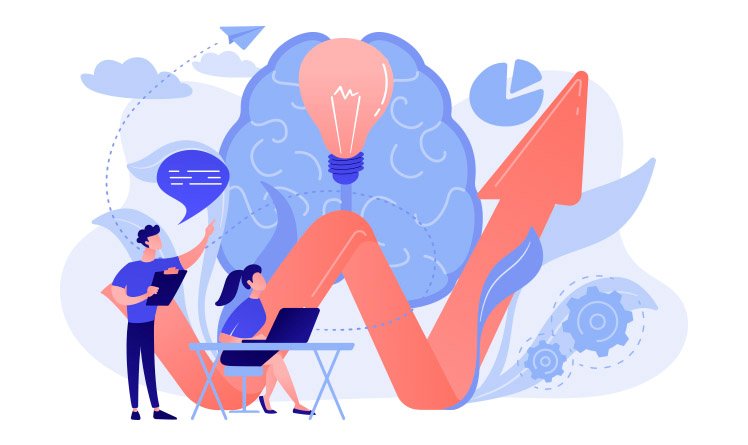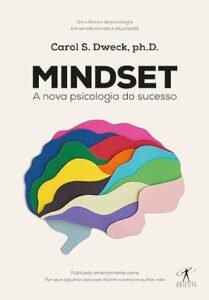Growth Mindset: What it is and how this model works

|
Getting your Trinity Audio player ready...
|
THE mindset of growth It’s more than just a mindset; it’s a transformative approach to facing challenges, learning, and thriving.
In this article, we will dive into the roots of mindset of growth, exploring what makes it so impactful and how its application can boost personal and professional development.
The concept of mindset of growth
Have you ever felt frustrated because you couldn't learn something new or improve a skill? Have you ever thought that you weren't smart or talented enough to achieve your goals? If so, you may be suffering from a mindset fixed, that is, a mentality that limits your potential for personal and professional growth.
Let's start our journey by understanding what exactly is mindset of growth. This mindset is based on the belief that skills and intelligence can be developed through effort, learning and persistence. Thus, it is the opposite of mindset fixed, which believes that abilities and intelligence are innate and cannot be changed.
the term mindset means “mindset”, that is, the way you see yourself and the world around you. The mindset influences your beliefs, attitudes, behaviors and results.
THE mindset of growth is a concept developed by psychologist Carol Dweck, author of the book “Mindset: The New Psychology of Success.” Dweck conducted research that showed that mindset of growth can have a significant impact on academic, professional and personal success.
Neuroscience and neuroplasticity
Neuroscience confirms this view with the concept of neuroplasticityAfter all, our brains are capable of creating new neural connections throughout our lives, meaning no one is "stuck" with the abilities they were born with. In other words, whenever we learn something new, practice a skill, or change a habit, new brain pathways are formed. This scientific discovery is the biological basis of the growth mindset and proves that change is always possible.
“Neuroscience shows that the brain is plastic, meaning it can create new connections at any age — scientific proof of the growth mindset.”
NLP and the assumptions
THE Neuro-Linguistic Programming (NLP) This also reinforces this way of thinking. One of their assumptions One of the best-known ideas is that "there is no failure, only feedback." Therefore, each result—positive or not—is simply an opportunity for adjustment. In this way, this way of interpreting events avoids paralysis in the face of mistakes and strengthens persistence, a central characteristic of a growth mindset.
“Growth mindset is the belief that skills can be developed with effort, strategy, and feedback.”
Mindset fixed vs. mindset of growth: crucial differences
THE mindset fixed is based on the premise that intelligence and abilities are innate and unchangeable. Thus, people with mindset fixed tend to avoid challenges, give up easily when faced with obstacles, ignore feedbacks, feel threatened by the success of others and believe that talent is more important than effort.
Already the mindset growth theory is based on the idea that intelligence and skills can be developed through effort, strategy and feedback. In this way, people with this type of mindset They tend to seek challenges, persist in the face of difficulties, learn from mistakes, be inspired by the success of others, and believe that growth is possible for everyone.
Therefore, people with mindset fixed and mindset of growth have different beliefs about themselves and the world around them. These beliefs lead to different behaviors and outcomes.
Differences between the two mindsets:
- Perception of intelligence: people with mindset fixed believe that intelligence is an innate characteristic and cannot be changed. People with mindset of growth believe that intelligence can be developed and improved through effort and dedication.
- Perception of challenges: people with mindset fixed believe that challenges are a threat to their intelligence. People with mindset of growth believe that challenges are an opportunity to learn and grow.
- Perception of criticism: people with mindset fixed believe that criticism is a sign that they are incompetent. People with mindset of growth believe that criticism can be used to learn and improve.
- Perception of success: people with mindset fixed believe that success is a proof of their intelligence. People with mindset of growth believe that success is the result of effort and dedication.
Cultivating the mindset growth: effective strategies
THE mindset of growth It works as an engine of motivation and learning. People who have this model of thinking do not settle for what they already know or can do and seek to improve and surpass themselves.
It also acts as a shield against fear and frustration. People who have this mindset do not let failures or criticism get them down, but use them as a source of inspiration. feedback and improvement. They do not compare themselves to others, but to themselves, and celebrate their achievements and those of others.
In this way, cultivating this new model of mindset requires specific strategies:
1. Adopt a Positive Mindset About Learning
- See mistakes as opportunities: In this way, every mistake is a chance to learn something new. Replace thoughts like “I’m not good at this” put “I'm not good at this yet, but I can improve with practice.”
2. Embrace the Challenges
- Step out of your comfort zone: See challenges as ways to grow, rather than avoid them. Celebrate efforts and progress, not just results.
- Focus on your potential: Focus on what you can achieve, not what you can't achieve.
3. Accept the Feedback
- See the feedback as a gift, not a criticism. Use it to adjust strategies and improve.
- Practice active listening to really absorb what others have to say.
4. Set Learning Objectives
- Focus on the process, not just the end result. For example, instead of thinking about “getting promoted,” think about “learning new skills to grow professionally.” Instead, focus on the process of learning and growing.
- Break larger goals into smaller, measurable steps.
5. Reinforce Self-Knowledge
- Practice self-reflection to identify areas for improvement and celebrate achievements.
- Ask yourself regularly: “What did I learn today? How can I improve tomorrow?”
6. Cultivate Resilience
- Remember: failure is a false way of seeing yourself. What exists are feedbacks. Great achievements often come after mistakes and adjustments.
- Get inspired by stories of people who overcame difficulties through effort.
7. Invest in Continuous Learning
- Read books, take courses, participate in workshops. The more you expose yourself to new ideas, the more you grow.
- Practice curiosity. Ask “how?” and “why?” often.
8. Beware of Comparison
- Compare yourself to who you were yesterday, not to other people.
- Understand that progress is individual and not linear.
9. Mindfulness to break the autopilot
One of the biggest challenges in changing your mindset is getting out of autopilot mode. This is where mindfulness becomes a powerful ally. After all, practicing mindfulness allows you to learn to observe your thoughts without identifying with them, creating space for new choices.
This simple habit reduces self-criticism, improves focus, and helps direct energy toward learning.
“Mindfulness helps break autopilot, making it easier to adopt a growth mindset.”
10. Positive Psychology to change focus
Another essential tool is Positive Psychology, which invites you to direct your attention to your strengths, achievements and virtuesThis way, instead of wasting energy just fixing flaws, you learn to value what already works and can be expanded. Consequently, this generates more motivation, resilience, and satisfaction throughout the process.
“Positive Psychology reinforces this process by training the mind to focus on strengths and achievements, not just failures.”
Benefits of mindset of growth
THE mindset of growth brings several benefits to personal and professional life. Among them, we can highlight:
- More self-confidence and self-esteem;
- More mental health;
- More satisfaction and happiness;
- More creativity and innovation;
- More productivity and performance;
- More resilience and adaptability;
- More collaboration and leadership.
Developing change mindset
Develop a mindset of growth It’s not something that happens overnight, but rather an ongoing and conscious process. To do this, you need to change the way you think, speak and act towards yourself and your goals. Here are some tips to help you on this journey:
- Set challenging but realistic goals and plan how to achieve them;
- View problems as learning opportunities, not threats;
- Learn from your mistakes and those of others, and do not repeat them;
- Search feedbacks constructive, and do not ignore or take offense to them;
- Praise your effort and that of others, not just the result;
- Cultivate a positive and optimistic mindset, not a negative or pessimistic one;
- Expose yourself to new experiences and knowledge, and don't limit yourself to what you already know;
- Celebrate your achievements and those of others, and don't minimize or envy them.
Practical examples from everyday life
In practice, this can mean simple things. For example, a professional who receives critical feedback at work and, instead of feeling inadequate, uses that information to improve. Or a student who struggles with math but persists with new strategies until they master the material. Above all, even in relationships, mindset of growth appears when we begin to see conflicts as opportunities to learn more about ourselves and others.
In short…
As we conclude our exploration, it becomes clear that the mindset of growth It is not just a theory, but a powerful tool for personal and professional transformation. Thus, it is a powerful mindset that can have a positive impact on your life.
Therefore, incorporating this mindset into our daily approach not only drives our own growth, but also contributes to building more resilient and innovative communities.
So, don't waste time and start cultivating this new way of thinking and acting today. Remember that your potential is unlimited, and that you can achieve everything you want with dedication, strategy and feedback. Yours success It's all up to you!
FAQ – Questions and Answers about growth mindset
1. What is a growth mindset in a nutshell?
It is the belief that your intelligence and abilities can develop with effort, practice, and feedback.
2. What is the difference between a fixed and a growth mindset?
With a fixed mindset, you believe you were born with immutable limits. With a growth mindset, you understand that you can always learn and evolve.
3. How to start developing a growth mindset?
Practicing self-awareness, embracing mistakes as learning opportunities, and applying techniques such as mindfulness and positive psychology.
4. Does a growth mindset really change professional life?
Yes. People with this mindset tend to adapt better, learn faster, and achieve goals consistently.
5. Is there scientific evidence for the growth mindset?
Yes. Research by Carol Dweck and neuroscience studies on neuroplasticity show that the brain can continually evolve.
Recommended Reading:
Micro Habits – Small Changes That Change Everything – BJ Fogg
Image: Freepik
Article published on 12/08/2023 and updated on the date above.

Marcel Castilho is an expert in neuromarketing, neuroscience, mindfulness and positive psychology. In addition to being an advertiser, he also has a Master's degree in NLP – Neurolinguistic Programming. As the owner and founder of the communications agency VeroCom and also of the digital agency Vero Contents, he has been studying human behavior for over 30 years.




